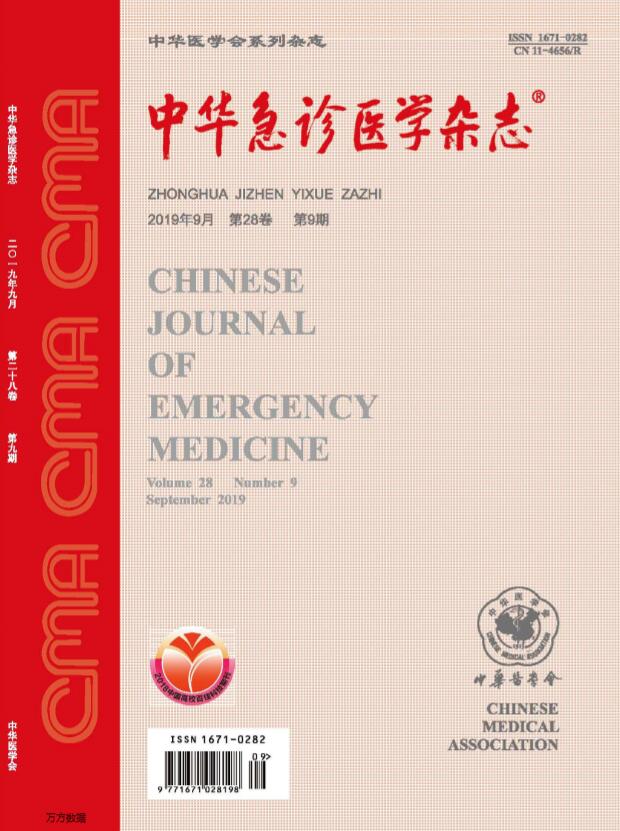The value of mechanical power to predict the potential of lung recruitment maneuvers and assess prognosis in patients with acute respiratory distress syndrome
Q4 Nursing
引用次数: 0
Abstract
Objective To investigate the value of mechanical power (MP) to predict the potential of the lung recruitment maneuver and assess prognoses in patients with acute respiratory distress syndrome (ARDS). Methods Patients with moderate-to-severe ARDS who required mechanical ventilation therapy longer than 24 hours were randomly selected April 2017 to April 2019. The lung recruitment maneuver (RM) protocol was performed according to the patient's condition, their MP, lung ultrasound score (LUS), oxygenation index (P/F), and dead volume ratio (Vd/Vt), which were monitored before the RM and one hour after the RM. The patients were divided into the lung recruitment maneuver potential positive group (RMP-P group) and lung recruitment maneuver potential negative group (RMP-N group) according to whether the variation in the patient's RM aeration score (ΔLUS) was≥5. Differences in MP between the two groups were compared and correlations between MP variation (ΔMP), aeration score variation (ΔLUS), oxygenation index variation (ΔP/F), and dead volume ratio variation (ΔVd/Vt) were analyzed. The receiver operating characteristic curve (ROC) was used to calculate the predictive value of MP for the potential of RM and the prognosis (28-day mortality) of patients with moderate or severe ARDS. Results Eighty-three patients were enrolled in the study, 45 in the RMP-P group and 38 in the RMP-N group. There was no statistical difference in the baseline levels between the two groups (P>0.05). After RM treatment, MP, LUS scores, and Vd/Vt for each patient in the two groups decreased significantly compared to the pre-RM values, whereas, the P/F increased significantly (P 0.05). The ΔMP, ΔLUS, and ΔVd/Vt in the RMP-P group were significantly higher than those in the RMP-N group (P 0.05). There was a significant positive correlation between ΔMP and ΔLUS and ΔVd/Vt in all patients (r=0.4746, 0.3995, P 0.05). The area under the ROC curves of ΔMP for predicting the potential of RM was 0.856, with a sensitivity of 91.1% and a specificity of 63.2%. The AUC of the 28-day survival status was 0.788, with a sensitivity of 84.3% and a specificity of 62.5% (P<0.05). Conclusions Mechanical power monitoring before and after RM can be used to predict the potential of the lung recruitment maneuver and assess the prognosis in patients with moderate-to-severe ARDS. Key words: Acute respiratory distress syndrome; Mechanical power; Recruitment maneuver potential; Lung ultrasound score; Prognosis机械功率在预测急性呼吸窘迫综合征患者肺复吸运动潜力和评估预后中的价值
目的探讨机械功率(MP)在预测急性呼吸窘迫综合征(ARDS)患者肺复吸运动潜能及评价预后中的价值。方法随机选择2017年4月~ 2019年4月期间需机械通气治疗时间超过24小时的中重度ARDS患者。根据患者的病情、MP、肺超声评分(LUS)、氧合指数(P/F)、死亡体积比(Vd/Vt),分别于RM前和RM后1小时监测肺再灌注操作(RM)方案。根据患者RM通气评分(ΔLUS)变化是否≥5分,将患者分为肺回缩机动电位阳性组(RMP-P组)和肺回缩机动电位阴性组(RMP-N组)。比较两组间MP的差异,并分析MP变化(ΔMP)、通气评分变化(ΔLUS)、氧合指数变化(ΔP/F)、死体积比变化(ΔVd/Vt)之间的相关性。采用受试者工作特征曲线(ROC)计算MP对中重度ARDS患者RM电位及预后(28天死亡率)的预测值。结果83例患者入组,其中RMP-P组45例,RMP-N组38例。两组基线水平比较,差异无统计学意义(P < 0.05)。RM治疗后,两组患者MP、LUS评分、Vd/Vt均较RM治疗前显著降低,P/F显著升高(P 0.05)。RMP-P组的ΔMP、ΔLUS、ΔVd/Vt均显著高于RMP-N组(P < 0.05)。所有患者的ΔMP与ΔLUS、ΔVd/Vt呈显著正相关(r=0.4746、0.3995,P 0.05)。ΔMP的ROC曲线下面积为0.856,灵敏度为91.1%,特异度为63.2%。28天生存状态的AUC为0.788,敏感性为84.3%,特异性为62.5% (P<0.05)。结论机械动力监测可用于预测中重度ARDS患者肺复吸活动的潜力,评估预后。关键词:急性呼吸窘迫综合征;机械功率;招聘机动潜力;肺超声评分;预后
本文章由计算机程序翻译,如有差异,请以英文原文为准。
求助全文
约1分钟内获得全文
求助全文
来源期刊

中华急诊医学杂志
Nursing-Emergency Nursing
CiteScore
0.10
自引率
0.00%
发文量
8629
期刊介绍:
Chinese Journal of Emergency Medicine is the only national journal which represents the development of emergency medicine in China. The journal is supervised by China Association of Science and Technology, sponsored by Chinese Medical Association, and co-sponsored by Zhejiang University. The journal publishes original research articles dealing with all aspects of clinical practice and research in emergency medicine. The columns include Pre-Hospital Rescue, Emergency Care, Trauma, Resuscitation, Poisoning, Disaster Medicine, Continuing Education, etc. It has a wide coverage in China, and builds up communication with Hong Kong, Macao, Taiwan and international emergency medicine circles.
 求助内容:
求助内容: 应助结果提醒方式:
应助结果提醒方式:


